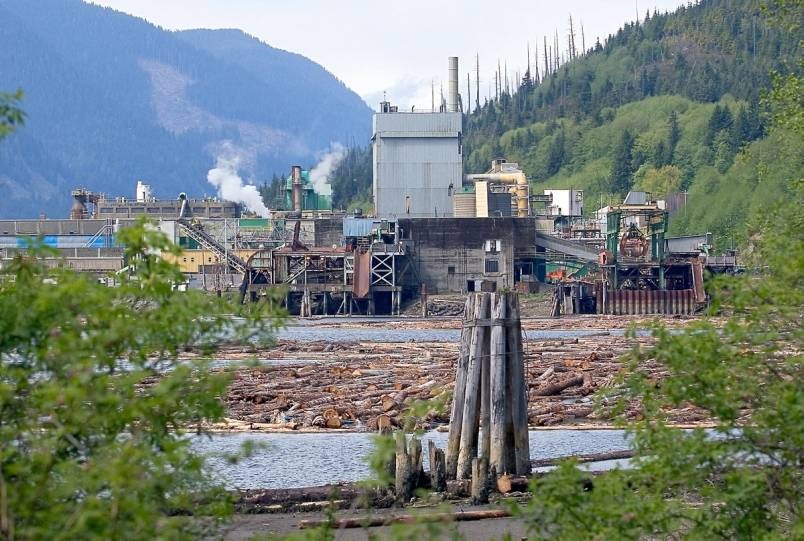The shuttered pulp mill at Port Alice still looms large as a reminder of how it used to be in the remote North Island village — well-paying jobs that brought supporting businesses and a sense of vibrancy.
But Mayor Kevin Cameron is looking forward, saying its highly unlikely the mill will ever reopen.
He sees tourism as a small step in getting Port Alice on a new economic track.
“We can’t keep looking back,” Cameron said Monday, “otherwise you’re just gonna get a sore neck. “We’ve got to do something different. We’ve got to get over [the mill] and move forward.”
The mayor has a sense of optimism this spring after the province gave the community $335,000 to develop an area to launch kayaks and for picnic spots on Frigon Island and surrounding islets, about 1.5 kilometres from the village’s shore in Neroutsos Inlet off Quatsino Sound.
Cameron believes the ocean and lake waters around Port Alice make it ideal as a kayaking destination, and that with tourist dollars coming in other investments could start flowing.
The village of about 600 people doesn’t have a hotel or a restaurant, although there are a handful of bed & breakfasts and the grocery store prepares some meals. A campground caters to larger trailers, but there could be discussions about a new village site for tenters, said Cameron.
He is interested in anything that will attract tourists and keep them in the area for multiple days.
“We are the sea otter capital of Canada,” said Cameron. “Since the mill closed, the waters have changed and we’ve seen a lot of humpback whale traffic. We’re seeing 30 to 40 sightings in a short period of time.”
He said the pandemic is bringing more people into the village. Hikers and anglers are discovering the area as parks and hiking spots closer to larger centres experience crowding. “I think we have the wow factor here … but we need [tourists] to stick around a little longer,” he said.
Cameron said the kayak launch will likely be built in Lion’s Park and discussions with the service club on what form it will take — such as beach improvements and docks — will start right away. Picnic and landing sites will also be prepared for Frigon Island.
The province is spending $9.2 million overall in 14 communities to support tourism infrastructure developments.
The projects included updated trails for e-bikes and adaptive trikes, signage, solar electric-vehicle charging stations, water park construction, and creating arts and culture stages.
Cameron said funding for kayaking infrastructure offers his community opportunities to support tourism and economic development that wouldn’t be possible otherwise. “We are grateful to the provincial government for making this possible,” he said.
“You get something like a kayaking launch started and who knows what follows,” maybe someone will open a restaurant or kayak rental store, he said.
Forestry is still a major employer in the area. The mill and deep-water port were the economic bedrock since 1916, but closed permanently in 2015, throwing about 400 people from towns around the North Island out of work.
Funding recipients
Other Island communities receiving provincial funding, totalling about $5.58 million, include:
• Ladysmith: Paved food truck pad and accessible walkway at waterfront park, $96,360; community park shelters, $170,000; Transfer Beach accessible washroom construction, $408,000; community park amenities including picnic tables, bike racks and bike service station, $27,192
• North Cowichan: Mount Tzouhalem access point development with parking stalls, accessible washroom, signage, $173,764; Kinsmen Beach accessible washroom construction, $312,500; Mount Prevost mountain bike trail upgrades with signs, $97,912; Waterwheel Park lighting and wayfinding signs, $100,000
• Parksville: Community park playground resurfacing and expansion, $315,000
• Port Hardy: Carrot/Rotary Park washrooms construction. $348,500
• Tofino: Sustainable transportation upgrades to multi-use path with transit stop, bicycle parking and on-street parking spaces, $800,000
• Ucluelet: Village green revitalization with public seating, expanded green space and a new playground, $700,000
• Qualicum Beach: Waterfront expansion with parking, mobile vendors amenities, covered seating, washroom, and overnight recreational vehicle parking spaces, $700,000
Total for Vancouver Island region: $4,584,228
dkloster@timescolonist.com



